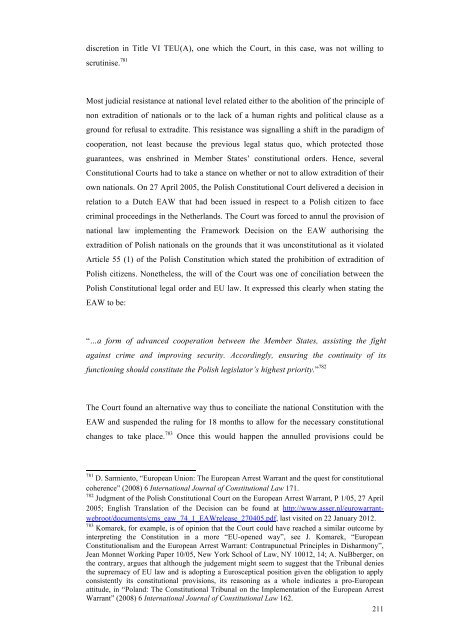The evolution of European Union criminal law (1957-2012)
The evolution of European Union criminal law (1957-2012)
The evolution of European Union criminal law (1957-2012)
You also want an ePaper? Increase the reach of your titles
YUMPU automatically turns print PDFs into web optimized ePapers that Google loves.
discretion in Title VI TEU(A), one which the Court, in this case, was not willing to<br />
scrutinise. 781<br />
Most judicial resistance at national level related either to the abolition <strong>of</strong> the principle <strong>of</strong><br />
non extradition <strong>of</strong> nationals or to the lack <strong>of</strong> a human rights and political clause as a<br />
ground for refusal to extradite. This resistance was signalling a shift in the paradigm <strong>of</strong><br />
cooperation, not least because the previous legal status quo, which protected those<br />
guarantees, was enshrined in Member States’ constitutional orders. Hence, several<br />
Constitutional Courts had to take a stance on whether or not to allow extradition <strong>of</strong> their<br />
own nationals. On 27 April 2005, the Polish Constitutional Court delivered a decision in<br />
relation to a Dutch EAW that had been issued in respect to a Polish citizen to face<br />
<strong>criminal</strong> proceedings in the Netherlands. <strong>The</strong> Court was forced to annul the provision <strong>of</strong><br />
national <strong>law</strong> implementing the Framework Decision on the EAW authorising the<br />
extradition <strong>of</strong> Polish nationals on the grounds that it was unconstitutional as it violated<br />
Article 55 (1) <strong>of</strong> the Polish Constitution which stated the prohibition <strong>of</strong> extradition <strong>of</strong><br />
Polish citizens. Nonetheless, the will <strong>of</strong> the Court was one <strong>of</strong> conciliation between the<br />
Polish Constitutional legal order and EU <strong>law</strong>. It expressed this clearly when stating the<br />
EAW to be:<br />
“…a form <strong>of</strong> advanced cooperation between the Member States, assisting the fight<br />
against crime and improving security. Accordingly, ensuring the continuity <strong>of</strong> its<br />
functioning should constitute the Polish legislator’s highest priority.” 782<br />
<strong>The</strong> Court found an alternative way thus to conciliate the national Constitution with the<br />
EAW and suspended the ruling for 18 months to allow for the necessary constitutional<br />
changes to take place. 783 Once this would happen the annulled provisions could be<br />
781 D. Sarmiento, “<strong>European</strong> <strong>Union</strong>: <strong>The</strong> <strong>European</strong> Arrest Warrant and the quest for constitutional<br />
coherence” (2008) 6 International Journal <strong>of</strong> Constitutional Law 171.<br />
782 Judgment <strong>of</strong> the Polish Constitutional Court on the <strong>European</strong> Arrest Warrant, P 1/05, 27 April<br />
2005; English Translation <strong>of</strong> the Decision can be found at http://www.asser.nl/eurowarrantwebroot/documents/cms_eaw_74_1_EAWrelease_270405.pdf,<br />
last visited on 22 January <strong>2012</strong>.<br />
783 Komarek, for example, is <strong>of</strong> opinion that the Court could have reached a similar outcome by<br />
interpreting the Constitution in a more “EU-opened way”, see J. Komarek, “<strong>European</strong><br />
Constitutionalism and the <strong>European</strong> Arrest Warrant: Contrapunctual Principles in Disharmony”,<br />
Jean Monnet Working Paper 10/05, New York School <strong>of</strong> Law, NY 10012, 14; A. NuBberger, on<br />
the contrary, argues that although the judgement might seem to suggest that the Tribunal denies<br />
the supremacy <strong>of</strong> EU <strong>law</strong> and is adopting a Eurosceptical position given the obligation to apply<br />
consistently its constitutional provisions, its reasoning as a whole indicates a pro-<strong>European</strong><br />
attitude, in “Poland: <strong>The</strong> Constitutional Tribunal on the Implementation <strong>of</strong> the <strong>European</strong> Arrest<br />
Warrant” (2008) 6 International Journal <strong>of</strong> Constitutional Law 162.<br />
211
















